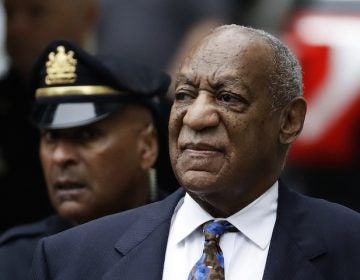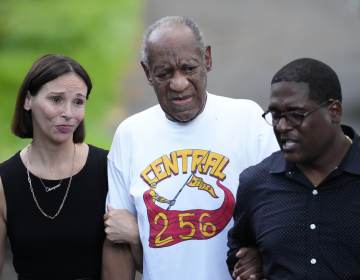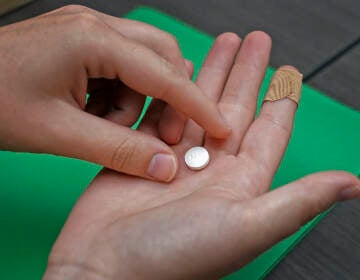Bill Cosby freed from prison after sex assault conviction overturned by Pa. Supreme Court
Cosby has served more than two years of a three- to 10-year sentence at a state prison near Philly. He had vowed to serve all 10 years rather than acknowledge any remorse.
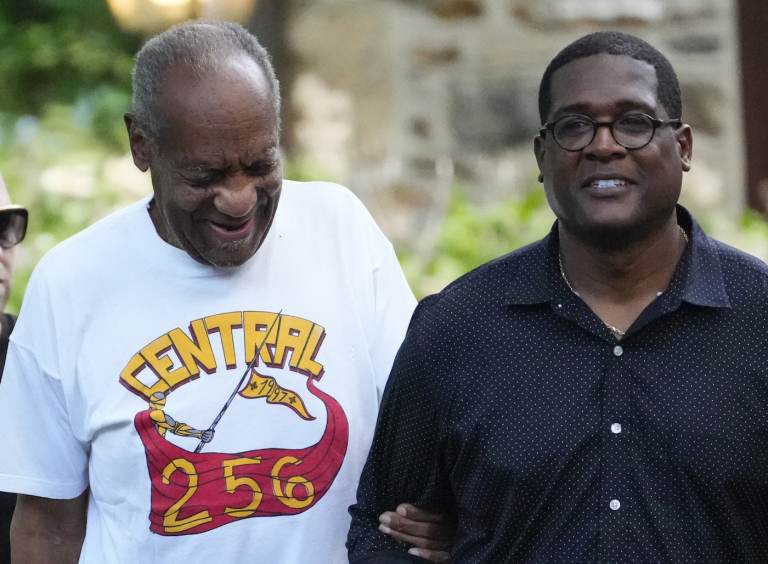
Comedian Bill Cosby, left, and spokesperson Andrew Wyatt approach members of the media gathered outside the home of the entertainer in Elkins Park, Pa., Wednesday, June 30, 2021. (AP Photo/Matt Slocum)
Bill Cosby has been released from prison.
Pennsylvania’s highest court overturned the former actor and comedian’s sex assault conviction Wednesday based on Fifth Amendment grounds. The decision, which comes more than two years into Cosby’s three-to-10 year sentence, hinges on a previous prosecutor’s agreement that he wouldn’t charge Cosby criminally, and says Cosby can’t be tried again.
That prosecutor was former Montgomery County District Attorney Bruce Castor, who also defended former President Donald Trump in his second impeachment trial. Castor didn’t respond to a request for comment.
The current Montgomery County DA, Kevin Steele, who made the decision to arrest Cosby in 2015, said the decision was based on “a procedural issue that is irrelevant to the facts of the crime.”
“I want to commend Cosby’s victim Andrea Constand for her bravery in coming forward and remaining steadfast throughout this long ordeal, as well as all of the other women who have shared similar experiences,” he said in a statement. “My hope is that this decision will not dampen the reporting of sexual assaults by victims.”
Constand and her civil attorneys, Dolores Troiani and Bebe Kivitz, released a joint statement calling the decision “disappointing” and said they’re concerned for two reasons: they think it might discourage others from seeking justice for sexual assault, and they worry it could force victims to choose between filing criminal and civil actions.
“We were not consulted or asked our thoughts by Mr. Castor concerning any agreements concerning immunity or anything, and we were not made aware if there were any such discussions,” they said of Castor’s 2005 decision.
Soon after he returned home, Cosby, flanked by lawyers and supporters, made an appearance outside his suburban Philadelphia home. He didn’t answer questions; instead, his lawyers spoke for him.
Jennifer Bonjean, his appeals lawyer, said the Supreme Court had proven it was “impervious to the court of public opinion” and that Cosby should never have been prosecuted in the first place.
“He had every right to rely on the prosecutor’s word, and they pulled the rug out from underneath him because of politics,” she said, adding that Cosby remains in excellent health, apart from being legally blind.
The only paths forward for the case are narrow. The verdict from the state court bars any further action in Pennsylvania, unless new accusers come forward and new charges are filed.
Prosecutors could also ask the Pennsylvania Supreme Court for reargument or reconsideration, but Peter Goldberger, a suburban Philadelphia lawyer with an expertise in criminal appeals, said given the court’s “lengthy opinion, with a thoughtful concurring opinion and a thoughtful dissenting opinion,” it would be a very long shot.
The Montgomery County DA’s office could also appeal to the U.S. Supreme Court, though Thomas Bergstrom, a prominent attorney who has defended the Catholic Church in abuse cases, said any appeal from the DA would have to argue specifically “that the Supreme Court of Pennsylvania misread or misconstrued or in some fashion violated the canons of the federal constitution.”
In a press conference Wednesday, celebrity attorney Gloria Allred, who represented 33 Cosby accusers, including the majority of the “prior bad-act” witnesses who testified in both of Cosby’s criminal cases, said she anticipates a different way forward: another civil case.
Allred currently represents Judy Huth, who says Cosby assaulted her in the Playboy Mansion in 1974, when she was 15, in an LA County civil case. The case had been stayed pending the conclusion of Cosby’s criminal case, and Allred says now that it’s over, she plans to move forward quickly.
“We will be having a status conference with the court in Santa Monica in August, and we will be informing the court officially of the Pennsylvania Supreme Court’s decision to overturn the conviction,” she said. “We’re going to be doing more discovery, and that will include a deposition of Mr. Cosby.”
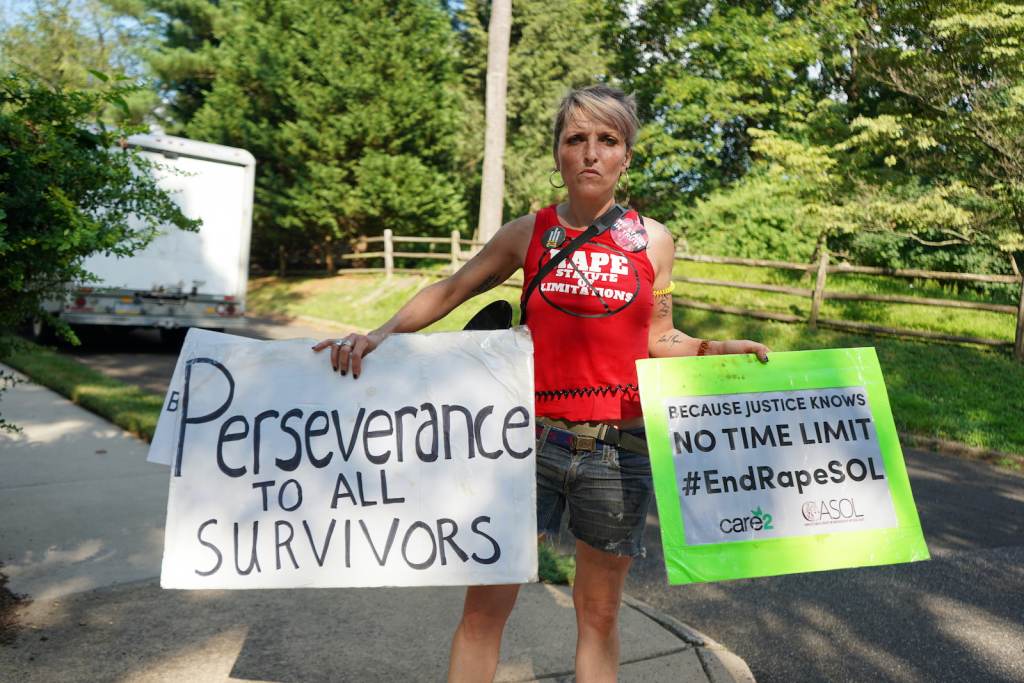
The backstory
The state court’s 4-3 decision Wednesday is the latest in the long, tangled legal proceedings of the 83-year-old Cosby, once beloved as “America’s Dad.”
It began in 2005.
That January, Andrea Constand, a Temple University employee who had met Cosby through the school, reported to police that Cosby had sexually assaulted her at his suburban estate a year previously.
Because of the delay in her report, among other factors, Castor said at the time that he’d decided a successful criminal prosecution was unlikely. He later testified that he’d made a public statement saying his office wouldn’t prosecute Cosby because then, he believed Cosby “would not be allowed to take the Fifth Amendment in the subsequent civil suit that Andrea Constand’s lawyers had told us they wanted to bring.”
Based on that assurance, Cosby provided several sworn depositions in which he provided, as the justices wrote in their new opinion, “several incriminating statements” about his use of drugs to “facilitate his sexual exploits.”
When those depositions were unsealed a decade later, they became the basis for a new trial that Castor’s successor as DA pursued against Cosby, and which ultimately saw him convicted.
Justice David Wecht, who wrote the Pennsylvania Supreme Court’s majority opinion overturning Cosby’s conviction, said that Cosby’s right to due process was violated.
“In accordance with the advice [of] his attorneys, Cosby relied upon D.A. Castor’s public announcement that he would not be prosecuted. His reliance was reasonable, and it resulted in the deprivation of a fundamental constitutional right when he was compelled to furnished self-incriminating testimony,” Wecht wrote. “The subsequent decision by successor D.A.s to prosecute Cosby violated Cosby’s due process rights.”
Wecht went on to say: “There is only one remedy that can completely restore Cosby to the status quo ante. He must be discharged, and any future prosecution on these particular charges must be barred. We do not dispute that this remedy is both severe and rare. But it is warranted here, indeed compelled.”
The case divided the court.
Justices Debra Todd, Christine Donohue, and Sallie Mundy signed on to Wecht’s opinion.
Justices Kevin Dougherty and Max Baer agreed that “due process does not permit the government to engage in this type of coercive bait-and-switch,” and that Cosby’s incriminating depositions shouldn’t be used as evidence, but argued that the actor’s conviction did not necessarily need to be vacated.
Justice Thomas Saylor dissented completely, rejecting the argument that Castor’s initial decision not to prosecute Cosby had any binding effect on “his own future decision-making processes, let alone those of his successor.”
Cosby was recently denied parole for refusing to participate in sex offender programs or admit remorse. He had vowed to serve all 10 years of his sentence rather than acknowledge any wrongdoing.
Cosby spokesperson Andrew Wyatt called the parole board decision “appalling.”
Cosby’s petition for appeal had also asked the court to rule on whether five other accusers, who also said Cosby drugged and sexually assaulted them decades previously, should be admitted as evidence against him. The court opted not to rule on that question, saying its ruling based on his Fifth Amendment rights made it “moot.”
Cosby was the first celebrity tried and convicted in the #MeToo era, so the reversal could make prosecutors wary of calling other accusers in similar cases. The law on prior bad act testimony varies by state, though, and the ruling only holds sway in Pennsylvania.
The justices voiced concern not just about sex assault cases, but what they saw as the judiciary’s increasing tendency to allow testimony that crosses the line into character attacks. The law allows the testimony only in limited cases, including to show a crime pattern so specific it serves to identify the perpetrator.
In New York, the judge presiding over last year’s trial of movie mogul Harvey Weinstein, whose case had sparked the explosion of the #MeToo movement in 2017, let four other accusers testify. Weinstein was convicted and sentenced to 23 years in prison. He is now facing separate charges in California.
In Cosby’s case, one of his appellate lawyers said prosecutors put on vague evidence about the uncharged conduct, including Cosby’s own recollections in his deposition about giving women alcohol or quaaludes before sexual encounters.
“The presumption of innocence just didn’t exist for him,” Jennifer Bonjean, the lawyer, argued to the court in December.
Prosecutors said Cosby repeatedly used his fame and “family man” persona to manipulate young women, holding himself out as a mentor before betraying them.
Cosby, a groundbreaking Black actor who grew up in public housing in Philadelphia, made a fortune estimated at $400 million during his 50 years in the entertainment industry. His trademark clean comedy and homespun wisdom fueled popular TV shows, books and standup acts.
He fell from favor in his later years as he lectured the Black community about family values, but was attempting a comeback when he was arrested.
“There was a built-in level of trust because of his status in the entertainment industry and because he held himself out as a public moralist,” Assistant District Attorney Adrienne Jappe, of Montgomery County, argued to the justices.
Cosby had invited Constand to an estate he owns in Pennsylvania the night she said he drugged and sexually assaulted her.
Constand, a former professional basketball player was the only of Cosby’s accusers to go to police.
WHYY does not typically identify sexual assault victims without their permission, which Constand has granted.
The Associated Press contributed to this report.
Correction: A previous version of this article said the court ruled that certain witness testimony tainted the trial, but the justices called the question moot.
WHYY is your source for fact-based, in-depth journalism and information. As a nonprofit organization, we rely on financial support from readers like you. Please give today.


